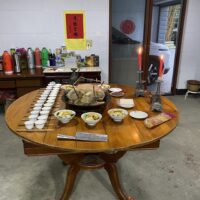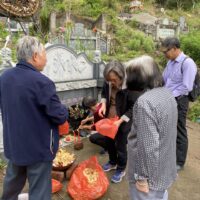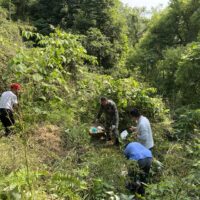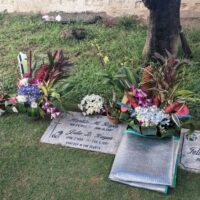Navigating Eco-Grief with Ancestral Grieving Practices

This essay explores the possibilities of learning from ancestral grieving practices to navigate eco-grief. It is part of the Troubling Time series, which interrogates environmental ideas, spaces, processes, and problems through the lens of temporality. Series editors: Rebecca Laurent, Rudy Molinek, Samm Newton, Prerna Rana, and Weishun Lu.
Every year, scientists and storytellers accumulate more evidence of unprecedented changes and irreversible losses. In navigating current climate realities and fighting for climate justice, it’s common to slip into feelings of dread, panic, anxiety, and grief. Ecological grief (or eco-grief) is a natural emotional response to experiencing or anticipating loss of land, species, ecosystems, and meaningful places due to environmental change. It is a growing concern for people around the world as the climate crisis worsens.
The changes may be unprecedented, but eco-grief is a long-standing experience. Communities with close, cultural relationships to the land, especially Indigenous communities, have long mourned the ecological loss spurred by colonialism, capitalism, and white supremacy—the systems at the root of the climate crisis. In response to these systems, communities of the global majority have always engaged in practices of resistance and collective liberation. (Here, we use “global majority” as a strengths-based and solidarity-focused framing of Black, Indigenous, Latinx, Asian, and Pacific Islander peoples that decenters whiteness.) From this long history of resistance, we can learn how to transform oppressive structures and thrive amidst violence and harm.
Living in “layered” time means grounding our actions in past and present manifestations of love.
We also learn the power of grief as an extension of love and a guide to the liberation we seek to nurture. As many social justice movements demonstrate, making space for our emotions is a critical step in fighting for the survival and thriving of the places and communities we love. Collective grieving brings visibility to injustices and promotes solidarity. It allows us to reckon with the past while staying grounded in the present and the feelings it evokes for us. Political actions such as rallies, marches, and vigils, for example, transform collective grief into collective resistance (e.g. recent organizing for Palestinian Liberation and Land Back).
As members of the Asian diaspora, we—Christina Guevara and Rae Jing Han—have been looking toward our own ancestral wisdoms and histories to understand possibilities for collective grieving. Filipino and Chinese grieving practices offer examples of how we might make sense of our eco-emotions and respond to our changing socio-ecological world.
By learning from ancestral traditions, those experiencing eco-grief can make space for their emotions, imagine possible futures, and nurture expansive collectives—across space and time—in the fight for climate justice.
Ancestral Grieving Practices
In Chinese culture, building and tending to altars in the home is an important way to preserve the memories of people who have passed away, to welcome the spirits of our ancestors and guides, and to honor all that is sacred. The altar is a space of daily ritual, interaction, and relationality as people share their prayers, make offerings, light candles, and burn incense. On death anniversaries and special festival days, the living prepare their ancestors’ favorite foods as an expression of devotion and care. These altar-making practices are a form of ongoing grieving, a way to hold loved ones close and sustain their active presence in everyday life.
In addition to this daily practice, the annual Qingming (清明) Festival in early spring is an important time for Chinese communities to grieve and remember their ancestors. Families gather in cemeteries and other burial places to honor loved ones who have passed away by clearing and tidying their gravesites, lighting incense and candles, and making offerings of flowers, food, and joss paper. Qingming is also an opportunity for family and friends to connect with one another through sharing food and enjoying time outdoors. The name “Qingming” translates to “clear and bright.” A festival whose name connotes new beginnings and thriving futures but is centered around remembrance highlights the interconnectedness of the past and the present.

In May of 2023, Rae and their parents traveled to their home province of Zhejiang in China to commemorate the life of Rae’s grandfather, who passed away a few months prior. Although they weren’t able to celebrate Qingming in early April, they and their relatives dedicated several days to visiting and caring for the graves of their ancestors on both sides of Rae’s family. The burial sites vary from forested hillsides to a landscaped graveyard in the city, but in each place the group shared offerings, memories, and prayers to celebrate the spirits of their family members. Rae felt comforted by the ancient rituals and held by the presence of their relatives—both those who are living and those who have passed away.
In the Philippines and across the diaspora, there is a holiday known by many names including, All Souls’ Day, Undas, and Araw ng luluwa, on which families, friends, and neighbors come together in celebration at the gravesites of the loved ones they’ve lost. This collective grieving practice consists of preparing and eating traditional foods, singing, cleaning and decorating graves, making food offerings, and lighting candles. Unlike any other experience of loss and mourning Christina has had in the U.S., this holiday is truly a collective celebration of love and family.
In November of 2023, Christina experienced some of the beauty, joy, and gratitude of collective grieving when she and her family brought her grandfather’s ashes back to the Philippines to celebrate his life in his homelands. On three different days, they gathered in the cemetery of her grandparents’ neighborhood of Manila, to sit with their loved ones (past and present) and share stories and food. Throngs of people lined the streets, selling orchid arrangements and hot lumpia, while endless lines of cars, scooters, and pedestrians paraded in and out to the sounds of church bells and singing. It was a beautiful scene of community and coming together to be a part of each day.
Practicing traditions embedded in our cultural knowledge systems is a powerful way to ground ourselves in past, present, and future relationships. We remember those we have lost, while also celebrating and giving thanks for the time we still have with those who are living, and look forward to our futures together. This emphasis on celebrating and giving thanks for the past, present, and future can guide our engagement with eco-grief.
Focusing on processes of grief allows people to experience time in layered ways, rather than as a linear progression. Living in “layered” time means grounding our actions in past and present manifestations of love. This sense of time is a reminder of the reasons we act for change and gives us the strength to keep fighting for the just futures we need and want.
Collectively Grieving Ecological Losses
Though these traditional practices are focused on grieving the loss of specific loved ones, they can serve as inspiration for ways to collectively mourn and honor places, lands, and beings. Just as we visit the gravesites of our loved ones, we might also develop a regular practice with loved ones of visiting meaningful places – like the ocean you spent your childhood with, the park you and your best friend played at after school, or the tree you and your grandmother used to sit under together. We can reflect on the roles these places play in our lives and how they are transforming over time.
Reflecting on place can be more than an individual or solitary activity. Spending time remembering and documenting the relationships, responsibilities, and care that make these places special reminds people of their interconnectedness with human and more-than-human communities. This practice also helps people remain attuned to how the places once were and how they are changing due to climate change, an awareness that is essential for collective resistance.
Building an altar can be another powerful way to collectively honor the places, lands, and waters that are transforming due to climate change. This activity could be taken up in outdoor learning contexts, where youth and educators work together to gather items that hold significance, to share stories related to these items, and hold space for each other’s experiences and emotions. This could also be a shared activity during gatherings of friends and family, to deepen our understanding of how we relate to places as individuals and as a collective. Altars can be transient spaces or can be maintained through a regular ritual.
A few more possibilities for ecological grieving practices include:
- Holding space for ourselves and our loved ones to nurture connections to more-than-human beings through music and art
- Telling stories about and visiting lands that are significant for our families and ancestors across our diasporic journeys
- Learning about, growing, cooking with, and eating pre-colonial, native plants of our cultural communities
- Engaging with ancestral healing practices, cultivating relationships with plant allies, and creating herbal medicines with culturally significant plants

Strengthening our ecological connections through such grieving practices can shape our visions of the future, (re)affirm our commitments, and inspire action. These practices offer a way to reimagine and broaden the idea of “the collective.” To care for the collective is to ensure the wellbeing of our human and more-than-human relatives, including those who have passed away, those who are still living, and those who are not yet born. These strategies of collective survival and thriving are particularly crucial for marginalized communities, who have been and continue to be most harmed by intersecting systems of oppression.
Cultural Wisdom for Sustaining Life and Community
Like the cultural collective grieving practices we have named, traditions can help us return to what gives us life and what sustains us. “Sustainability” is often appropriated by government agencies and corporations to imply capitalism can save us in this changing climate. However, some cultural traditions are truly sustainable in the sense that they teach us how to build thriving futures by resisting modern consumerism.
Think about the elders who insist on eating every bit off chicken bones or how many cultural dishes make use of all parts of the animal, and the plant-derived materials used for traditional household items over nonrenewable plastics, or the general reuse of items you might typically throw away. Many of these individual consumption habits are done out of necessity, but they also instill values of collectivism or acting for the good of the whole (including all beings on Earth). They are more than just individual consumption habits and guide us to envision how a system rooted in long-term and collective thriving is possible.
Communities of the global majority have always engaged in practices of resistance and collective liberation.
As we, Christina and Rae, continue engaging as educators, scholars, and community members working towards collective thriving and liberation, we are rooted in gratitude for our ancestral cultural knowledges. At the same time, we recognize that cultural traditions are ever-evolving and may themselves be shaped by harmful systems. This requires critical reexamination of the impacts of cultural practices and intentional attunement to how these traditions may need to shift to become more sustainable and sustaining. We are committed to maintaining and transforming these traditions in ways that are responsive to current and future realities and contribute to intersectional justice.
As members of global majority communities, we learn that along with injustice, violence, and loss, there has always been joy, resistance, and care. Caring for our loved ones can generate a sense of purpose, clarity, and power by making tangible who and what we are fighting for. These forms of caregiving have sustained marginalized cultures and enabled us to navigate historical and ongoing forms of oppression. For the Asian diaspora and other marginalized communities, existential uncertainty is not a new phenomenon. We have always created and sustained life, cared for our biological and chosen families, and insisted on thriving amidst layered crises.
Featured image: Joss paper, which is typically used in offerings to ancestors in Chinese culture. Photo by Candelaria Wing, 2023.
Christina Guevara is a third-generation Filipina American living on Duwamish and Coast Salish homelands in Seattle, Washington. As an environmental educator and scholar, she facilitates learning spaces of intersectional environmentalism, and works to support the collective thriving of marginalized communities and the lands/waters they are culturally connected to. Outside of work, she enjoys dancing, fiber arts, spending time in/with the ocean, cooking, and sharing food with friends. Contact.
Rae Jing Han is a second-generation Chinese American who currently lives on Duwamish and Coast Salish homelands in Seattle, Washington. They are an educator, scholar, and artist committed to uplifting the cultural knowledge systems and lifeways of marginalized communities to move toward socio-ecological thriving and intersectional justice. Rae loves going for walks and runs, doing arts and crafts, cooking and eating with friends, and being outdoors with plant and animal kin. Contact.




You must be logged in to post a comment.